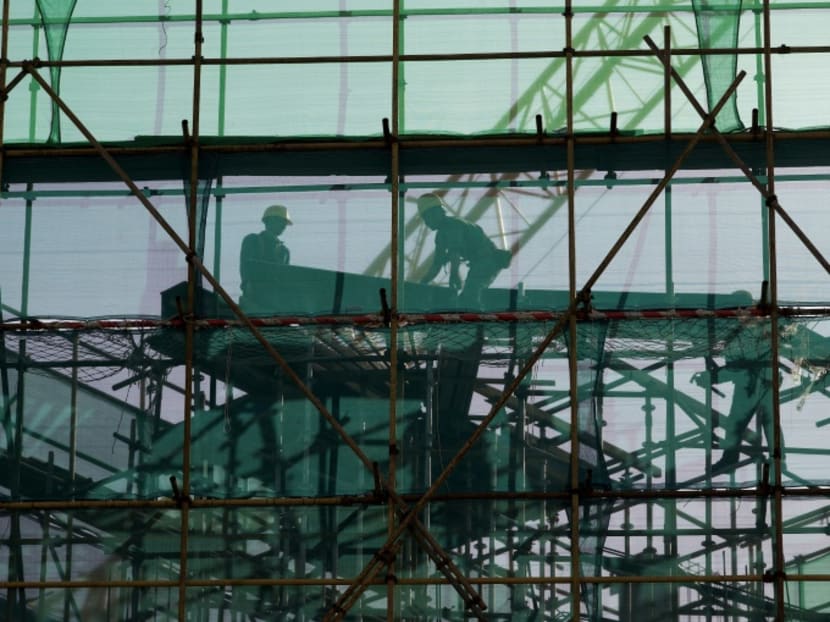Commentary: Property crisis presents China with a dilemma
As more developers default on debt and stall housing projects, buyers are threatening to stop making loan payments. For the Chinese government, an effort to short-circuit the spread of mortgage boycotts risks fuelling the behaviour it’s trying to prevent, says Matthew Brooker of Bloomberg Opinion.

Some of China's biggest property developers are struggling to make payments on their debts (Photo: AFP/File/Noel Celis)
HONG KONG: Here's a scenario. You buy a pre-construction apartment and start paying the mortgage before it's complete. The developer halts the project, has defaulted on its debt and it looks like the property may never get built.
You hear of buyers elsewhere who have stopped making their loan payments; the government has stepped in to ensure the builders have money and is considering giving mortgage borrowers a temporary holiday. What are you going to do?
This encapsulates the dilemma for the Chinese government in coming to the aid of buyers in stalled housing projects. An effort to short-circuit the spread of mortgage boycotts risks fuelling exactly the behavior it is trying to prevent.
Authorities had little choice but to do something, given the rising market alarm, and their intervention sparked a relief rally in property and bank stocks on Monday (Jul 18). Whether this marks a turning point or merely a pause before the next leg down in the real estate crisis remains to be seen.
The figures, on the face of things, suggest limited cause for concern. Affected loans amount to less than 0.01 per cent of outstanding residential mortgages at most Chinese banks, according to Fitch Ratings.
As much as 2 trillion yuan (US$297 billion) of advances could be impacted, Bloomberg News reported GF Securities Co as saying. Even that, which is a measure of assets rather than potential losses, is barely 5 per cent of China’s 38.8 trillion yuan of total outstanding mortgages.
If every buyer defaulted it would lead to a 388 billion yuan increase in nonperforming loans, Jefferies estimates.
LOSS OF CONFIDENCE IN HOUSING MARKET MIGHT INFECT FINANCIAL SYSTEM
That’s not to say the angst is misplaced. Anything but. After more than two years of living with the pandemic, everyone is more familiar with the implications of exponential growth rates.
The mortgage boycott started in late June with a single China Evergrande Group project in the city of Jingdezhen. That became 28, then 58, then at least 100 developments in more than 50 cities by Jul 13. As of Sunday, the tally was at least 301 projects in about 91 cities.
Capital Economics estimates that construction has been halted on around 13 million apartments in the past year, potentially affecting more than 4 trillion yuan in mortgage debt. Even if all this could be backstopped, there is no telling how such a loss of confidence might mutate and infect other parts of the financial system.
Just as troubling is the emergence of such non-payment tactics in the first place, a strain of behaviour hitherto unknown in China. The country has long been assumed to be immune from the type of self-feeding mortgage spiral that drove the United States subprime crisis. When you’re a fruit picker loaned 50 times your salary to buy a US$750,000 house with no money down, it’s little trouble to walk away if the market turns south.
The Chinese property market is a very different animal, with first-time buyers required to front 30 per cent of the purchase price, at least until regulations were relaxed earlier this year. When homeowners are laying out that much of their wealth to obtain a loan, it takes something catastrophic to get them to give up.
In Hong Kong, which had similarly onerous downpayment rules prior to the Asian financial crisis, mortgage defaults stayed low even as home prices slumped by more than 60 per cent starting in late 1997, with the delinquency rate peaking at 1.43 per cent in 2001.
In China’s second-tier cities, where the mortgage boycotts have been concentrated, prices of newly built homes are showing nothing like that scale of decline, though the trend is clearly negative.
PROPERTY THE MOST IMPORTANT STORE OF WEALTH FOR CHINESE OWNERS
Of course, the concern for the mortgage strikers isn’t the falling value of their investment but whether they will receive what they’ve paid for at all. With a record wave of developer defaults and home sales stuck in a prolonged slump, that’s a tangible fear. It’s hard to blame them for taking such a hardball approach.
Beyond the desire to cut their losses or put pressure on property companies to deliver, some buyers may have their own cash-flow problems amid the economic downturn, said David Qu, a Hong Kong-based economist with Bloomberg Economics.
The wider behavioral consequences of the homebuyers’ revolt can only be guessed at. Property is by far the most important store of wealth for most Chinese owners and is central to the unwritten social contract that the Communist Party will guarantee ever-rising living standards in return for acquiescence to its rule.
In the past, homeowners who bought in the earlier batches of a new project have been known to turn up and trash the sales office after the developer cuts prices for later tranches.
This is the paradox of this latest rescue measure. The financial distress afflicting the property market is a result of the government’s attempt to impose greater market discipline on developers and arrest the relentless buildup of leverage.
Even if the victims may be deserving this time, intervention keeps China locked into a pattern of protecting investors from the consequences of market failure. That’s probably still better than letting their faith in the system implode.





